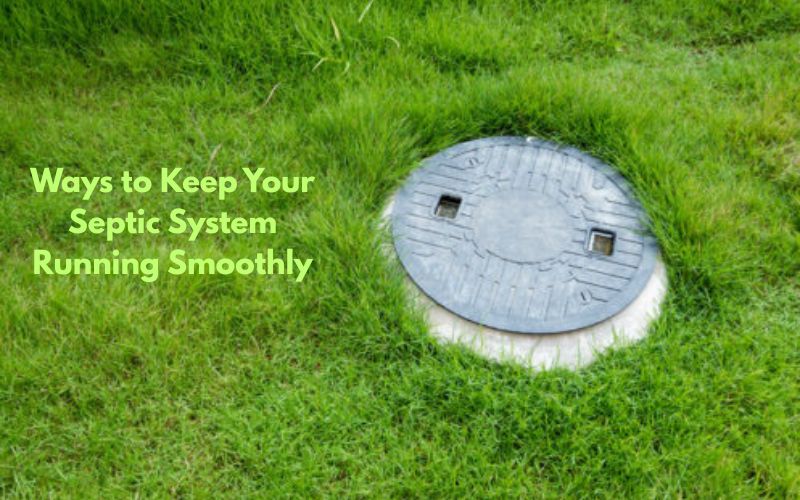5 Practical Ways to Keep Your Septic System Running Smoothly

For proper disposal of wastewater, a well-maintained septic tank is essential to ensure health and safety in your surroundings. However, maintenance becomes truly effective only when supported with the right products like septic tank cleaner powder. If you neglect septic system cleaning and fail to use septic tank cleaner powder regularly, it can lead to costly repairs, foul odors, health risks, and an unhealthy environment. With timely septic care and the right biological septic tank cleaner powder, you can keep your system efficient, safe, and long-lasting.
#1 Regular Inspection and Pumping
The septic system needs routine monitoring to ensure that everything functions well. The accumulated solids in the tank can reduce efficiency and increase the risk of clogs & backups. Look for experts for regular septic tank inspection; however, it depends on factors like property size, water usage, and tank size.

Next way, timely pumping whenever needed is important to prevent solids from building up & clogging. Typically, every three to five years, with higher water usage needs, septic system pumping services.
The Signs You Need Pumping and Inspection
- Slow drainage in sinks and toilets.
- An unpleasant smell around the yard or areas.
- Accumulated water near the drain field.
- Gurgling sound.
- Pests and flies in the drainage area.
-
Unusual grass grows over or around the septic tank area.
#2 Mindful With Draining
This is a point you should not avoid if you don’t want the septic tank to get choked. Avoid using non-biodegradable products and harmful substances.
A septic system relies on natural bacteria to break down waste efficiently. Therefore, the use of non-degradable substances can disrupt the natural bacterial balance and may cause blockage or system failures.
Items such as grease, fats, oils, wipes, diapers, sanitary pads, cotton swabs, bleach, paint, antifreeze, and food scraps can build sludge and block drainage systems. You must also avoid using excessive detergents & soaps, as they can disrupt the bacterial balance in the septic tank.
The Significant Role of Enzyme Treatments
Enzyme-based additives help in the simpler breakdown of waste in septic tanks and support bacterial activity. However, it doesn’t replace the need for regular pumping and maintenance, but it still benefits.
#3 Proper Water Usage
Every septic tank has the certainty to handle a specific amount of wastewater every day. The excessive use of water will overload the septic system, causing inefficiencies, clogging, backups and other failures. It can even risk contaminating the nearby groundwater sources.
The Tips To Reduce The Water Waste
- If you have leaky faucets and toilets, fix them to prevent unnecessary water flow.
- Install water-efficient appliances like low-flow toilet tanks and high-efficiency washing machines.
- Cut off or spread out the laundry loads every week instead of doing multiple loads in a single day.
- Try to avoid running multiple water-heavy appliances at a time, like dishwashers, washing machines, etc.
- Install faucet aerators in your home that help reduce water flow without impacting performance.
The Effects of Overloading The System
- The excessive usage of water can cause problems such as;
- Solids in the tank lead to backups.
- Drain field flooding and preventing the proper water filtration.
- Risk of contaminating the nearby groundwater sources.
- Lowers the bacterial efficiency because of excessive water dilution.
#4 Protect The Drain Field
The initial step is to understand the septic system as important to keep the drain field maintained. It's responsible for filtering wastewater back into the soil. Therefore, the area should be kept free from contamination and drainage should be maintained properly.
The Best Practices To Keep Drain Field Maintained
- Keep heavy objects off the drain field, such as not parking vehicles and placing heavy structures. It can hinder wastewater absorption.
- Keep a check on excessive moisture, as it can saturate the soil and interfere with proper wastewater processing.
- Proper grass plantation can help prevent erosion and promote the absorption of excessive moisture in drain fields. However, should not plant trees as they can root infiltrate septic tank pipes, causing blockages and structural damage.
- You must also be cautious with the use of chemicals like lawn fertilizers, herbicides and pesticides. It can impact soil and water filtration.
The Common Drain Field Signs To Watch For
- Soggy or swampy yard or areas.
- Foul odour.
- Sewage backup issues.
#5 Early Addressing To Prevent Costly Repairs
Any malfunctioning of the septic tank is directly associated with unaddressed maintenance. Therefore, recognizing early warning signs can help prevent later costly repairs and maintenance issues.
If you notice any problem as below, then contact a professional septic tank service provider immediately. Ignoring minor issues can cause system failures, costly excavation, and harm to the environment.
The Common Signs of Septic System Issues
- Slow draining in sinks and toilets indicates potential blockages in drain pipes.
- An overfilled tank with a foul smell means leaks and sludge buildups.
- Accumulation or pooling water around the yard means drain field failures or system overload.
- A gurgling sound in the plumbing is a signal for an impending septic tank backup.
- Emergency Septic Tank Failures
- The issues with complete septic tank failures may require;
- Full septic tank replacement.
- Drain field reconstruction.
- Excavation and removal of blocked pipes.
The Final Verdict
A properly maintained septic system ensures health, environmental safety, and property protection. By following best practices — timely inspection, mindful water usage, and early addressing of problems — you keep your septic system efficient for years. But the real game-changer is adopting biological solutions like septic tank cleaner powder. Using septic tank cleaner powder regularly helps prevent sludge buildup, controls odor, restores bacterial balance, and protects your soak pit. Whether you are looking to cut costs on repairs, extend the life of your tank, or keep your home environment healthy, septic tank cleaner powder is the smartest and simplest choice. Remember — septic tank cleaner powder is not just a product, it’s a preventive shield for your septic system.
FAQs
1. Why is septic tank cleaner powder important?
Septic tank cleaner powder restores healthy bacteria, breaks down waste, prevents odors, and ensures your septic tank runs efficiently.
2. How often should I use septic tank cleaner powder?
Use septic tank cleaner powder monthly for best results. It prevents sludge buildup, controls odors, and supports long-term septic health.
3. Can septic tank cleaner powder replace pumping?
No. Septic tank cleaner powder supports bacterial activity but does not replace the need for routine inspection and pumping every 3–5 years.
4. Does septic tank cleaner powder eliminate bad odors?
Yes. By breaking down waste and balancing bacteria, septic tank cleaner powder prevents foul smells around bathrooms, drains, and backyards.
5. What is the best septic tank cleaner powder in India?
Biological options like Bioclean Septic Tank Cleaner Powder are highly effective, eco-friendly, and safe for regular household use.




